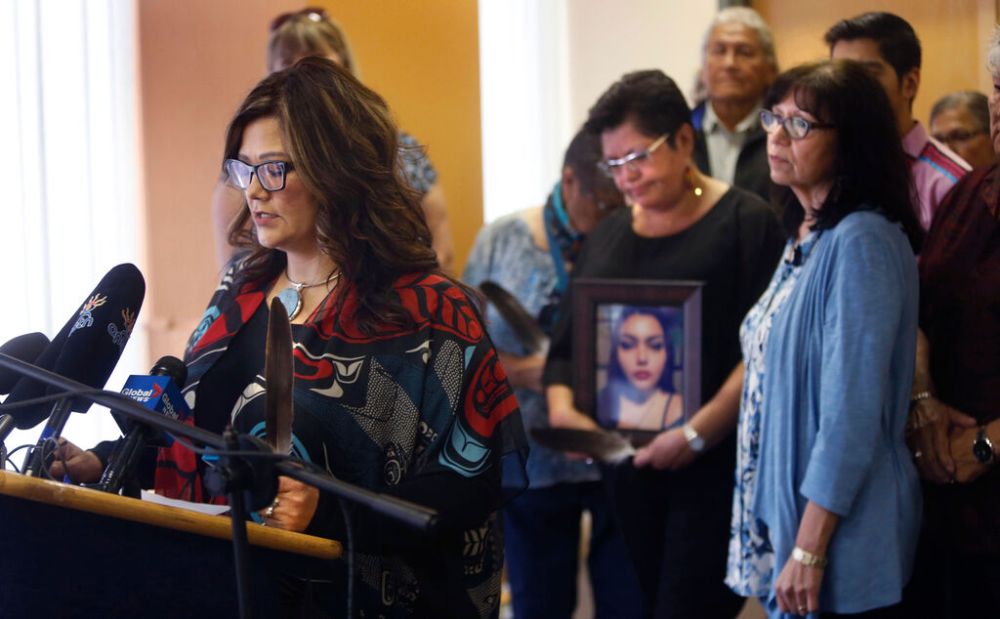Revisiting cold cases critical part of MMIWG action plan, advocates say
Advertisement
Read this article for free:
or
Already have an account? Log in here »
To continue reading, please subscribe:
Monthly Digital Subscription
$0 for the first 4 weeks*
- Enjoy unlimited reading on winnipegfreepress.com
- Read the E-Edition, our digital replica newspaper
- Access News Break, our award-winning app
- Play interactive puzzles
*No charge for 4 weeks then price increases to the regular rate of $19.00 plus GST every four weeks. Offer available to new and qualified returning subscribers only. Cancel any time.
Monthly Digital Subscription
$4.75/week*
- Enjoy unlimited reading on winnipegfreepress.com
- Read the E-Edition, our digital replica newspaper
- Access News Break, our award-winning app
- Play interactive puzzles
*Billed as $19 plus GST every four weeks. Cancel any time.
To continue reading, please subscribe:
Add Free Press access to your Brandon Sun subscription for only an additional
$1 for the first 4 weeks*
*Your next subscription payment will increase by $1.00 and you will be charged $16.99 plus GST for four weeks. After four weeks, your payment will increase to $23.99 plus GST every four weeks.
Read unlimited articles for free today:
or
Already have an account? Log in here »
Hey there, time traveller!
This article was published 03/06/2021 (1653 days ago), so information in it may no longer be current.
OTTAWA — Manitoba advocates say now is the time to start probing cold cases of missing Indigenous women, with an action plan Thursday pledging to re-investigate disappearances.
“This is a critical component,” said Winnipeg advocate Hilda Anderson-Pyrz.
“We heard during the national inquiry from coast to coast that policing was a huge problem.”

The Trudeau government joined provinces, Indigenous leaders and grassroots groups to finally publish a plan that responds to the national inquiry into missing and murdered Indigenous women, girls and LGBTTQ+ people.
The plan comes exactly two years after the inquiry wrapped up its report, an occasion the Manitoba government marked Thursday evening by bathing the Legislative Building in red light.
The plan contains relatively few suggestions for immediate action. Instead, it pledged to implement mechanisms with long-term funding to prevent Indigenous women from experiencing violence, through a separate implementation plan to make systemic changes.
Anderson-Pyrz has advocated for families ever since her sister Dawn was found dead in 2011, and now co-chairs the National Family and Survivors Circle, which helped Ottawa craft its plan.
“This cannot be merely checking off boxes to complete the cause for justice; we need accountability,” she said.
“There has to be a huge focus on prevention, and it has to be across many sectors.”
Diane Redsky, head of the Ma Mawi Wi Chi Itata centre, said Ottawa took the right approach.
“It was set up that way to get the money on the ground ASAP, because system reform takes a long time,” said Redsky, who helped craft the plan.
She said the $2.2 billion the Liberals allocated this spring will help with immediate front-line needs on the streets of Winnipeg, such as emergency housing.
The bulk of Thursday’s plan focuses on what comes next, Redsky said, and how Indigenous people can lead those efforts.
“When initiatives are rooted in culture and language, that goes a long way in supporting identity and supporting healing,” she said.
“The outcomes will not only be lifelong and positive, but… often are a cost-savings to the whole system.”
She was pleased the plan includes a “national task force, which reviews and re-investigates unresolved files of missing and murdered Indigenous women.”
Advocates in Manitoba have long asked for a separate body to review police work, in part because many families no longer trust the RCMP and Winnipeg Police Service.
Both forces have reviewed older files and improved training, but critics say they need to do more to address race- and gender-based violence.
Grieving families had pilloried the inquiry for requesting hundreds of cold-case files only in the last few months of the inquiry, despite having exceptional powers to subpoena documents from all provinces for two years.
Prime Minister Justin Trudeau said at a Thursday ceremony he accepted all findings of the inquiry, including that the issue of disappearing Indigenous women amounted to genocide, a term his government had previously avoided.
Yet it’s unclear if the federal Liberals will support all the calls in Thursday’s plan.
A section called “common short-term priorities” called for a “guaranteed annual livable income.” Anderson-Pyrz said that’s the only way to fix a patchwork of social programs that leave people destitute and at risk of exploitation.
Yet the government opted against a universal basic income in its large spring budget.
Thursday’s plan also called for a deputy commissioner overseeing federal prisons to assess how the disproportionately high number of Indigenous people are faring, and whether they can access rehabilitative programming.
The plan took heed of complaints from Métis groups that the inquiry didn’t focus on their needs, with Ottawa folding in 62 Métis recommendations into the 231 outlined by the inquiry.
Grassroots activists said they needed more detail to assess whether the plan announced Thursday will work for the province.
Under the banner of Manitoba Coalition, families of missing women had urged the inquiry to call out issues specific to the province, such as an ongoing clawback of federal dollars meant for foster children, and the dearth of affordable housing for both urban and remote Indigenous people.
“Manitoba, as a whole, has a very poor record on child poverty,” said Renee Kastrukoff, a coalition member from The Pas who chalked it up to constant squabbles over funding between Ottawa and the province.
“It needs to come down to all levels of government sharing for the caring of people, period.”
dylan.robertson@freepress.mb.ca






